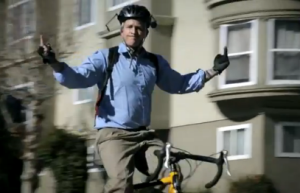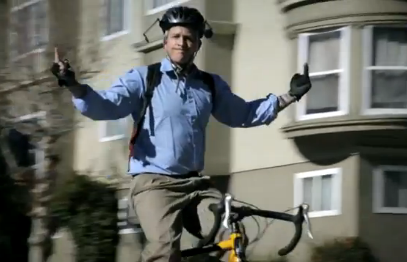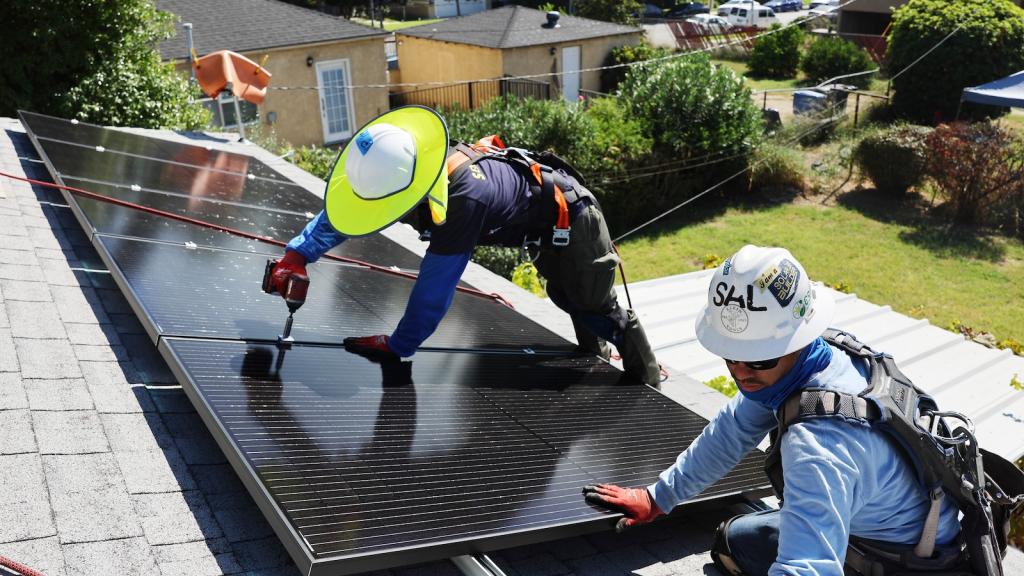
From "Motherfucking Bike," by Sons of Science
It was a Tuesday morning when I watched the cyclist — decked out in a green jacket and a bright yellow helmet, and laden with bags — ride into the crosswalk in front of a group of stopped cars, going against the flow of traffic. He was breaking a few laws — but for convenience and self-preservation, I sometimes break them, too. My hometown, Baltimore, is a terrible biking town.
So I felt some sympathy for the guy — that is, until he turned to a woman waiting in her car at the red light, and started yelling: “Hey! Hey! You’re not supposed to be in the crosswalk!”
He glared at her as he went by. In the next lane sat a black luxury car that looked like it had been buffed with a chamois cloth that morning. The driver rolled down his window and said something to the biker. This set the biker off. “Oh, yeah? Maybe I’ll just sit here for a while,” he said, and parked his bike in front of the black car.
As the light turned green, cars behind started honking. “I’ve got every right to be here!” screamed the guy in the yellow helmet after a few more choice words from the driver. “Every right!”
So this is the asshole cyclist I hear friends complain about — maybe the kind of asshole cyclist I have been from time to time. I couldn’t help but wonder: If we’re trying to make life better for cyclists on the streets, isn’t this kind of behavior counterproductive?
The relationship between cyclists and drivers is notoriously tense. A simple Google search will yield scores of articles and videos about fights. A horrific YouTube video shows a driver mowing down dozens of cyclists in a Critical Mass ride in Brazil. But it’s the comments on the video that really get to me: “This is most drivers’ secret fantasy,” says one. There are similar comments in other videos, with a common sentiment apparent in all: Cyclists are uppity, sanctimonious jerks. You know the type.
“I have no doubt that our public perception of us being asshole bikers is a huge challenge to overcome,” says Andy Clarke, president of the League of American Bicyclists. The morning I talked with him, a friend in Australia had sent him a link to a new public-service ad that shows two men who nearly bump into each other while walking through an office. As set hands pull away the office surroundings, dressing one man as a biker and the other as a driver, their polite apologies devolve into insults directed at lycra wear and sweet old mothers.
“There is something about being behind the wheel of the car and something about being behind the handlebars that changes us somehow,” Clarke says.
The league tries to encourage responsible riding. Seeing cyclists blow stop signs and ride with their hands off the handlebars really irks Clarke. “It doesn’t help our cause to be seen as scofflaws.” At the same time, he says, “I can understand why people behave the way they do on a bike, because the system isn’t set up to help them.”
That’s the understatement of the week. Mia Birk, an urban planner in Portland, Ore., who specializes in bike issues, says most rule-breaking by bicyclists is the result of poor design. The few people willing to brave the streets on bikes “have to be road warrior types because bikeway infrastructure stinks,” she says in an email.
Portland, rated one of the most bike-friendly American cities, has set up all kinds of bike infrastructure, and has launched education and outreach programs for both bikers and drivers. This has resulted in fewer crashes and friendlier behavior between cyclists and drivers in that city. “Sure, there are still jerks out there, but overall, there’s a high level of courtesy relative to less bike-friendly cities,” Birk writes.
Jonathan Maus, who runs the BikePortland blog, agrees that relationships between cyclists and drivers are probably better in Portland than in other places — in part because drivers are used to sharing the road with cyclists, and in part because many drivers are cyclists themselves. At the same time, he says, Portland cyclists feel more entitled. “In a place like Portland there are people that feel pretty strongly [about biking], and they are not about to cede their right to the road,” he said.
Brings to mind a certain episode of Portlandia …
But Maus has a fundamental objection to the entire conversation about “asshole bikers”: He doesn’t see cyclists as a separate group — in fact, he doesn’t even like the word “cyclist.” He just sees people on the road — polite people along with jerks. The whole notion of cyclists as a special group of people only helps to marginalize people who ride bikes, he says. It frames the argument for the haters.
“The reality is that even in a fantasy world where you could get everyone to behave perfectly, you would still have another barrier thrown up at you,” Maus saus, “because it’s not about how bikers are acting. It’s a basic cultural bias that prevents America from embracing biking.”
I was thinking about Maus’ words the other day when I saw a guy in a blue shirt and red tie on a bike, stopped at a red light. He waited, even though there was no traffic coming in either direction. When the light turned green and the cyclist slowly picked up speed, a guy in a black Saturn behind him gunned his engine impatiently, then nearly clipped the cyclist’s back wheel as he sped around.
The cyclist caught up with the driver at the next light, pulled up along the driver’s window, and calmly had a few words with him. Then the driver sped off.
I waved down the cyclist and learned that his name was Andrew Waldman. He has been commuting by bike for two years, and has had some close calls in that time — particularly when he’s broken traffic laws, so he has decided to follow the rules. “I don’t make it home that much faster if I run stoplights,” he said.
As for his encounter that day with the driver, Waldman said he had tried to explain that the law allowed a cyclist to take up a lane on the road. “He wasn’t interested in listening to me at all,” Waldman said. “I was pretty upset, but I kept my cool … If you’re calm, someone might see your side. If you lay into people, you’re going to be the one on the defensive eventually.”
And then, who’s the asshole again?


